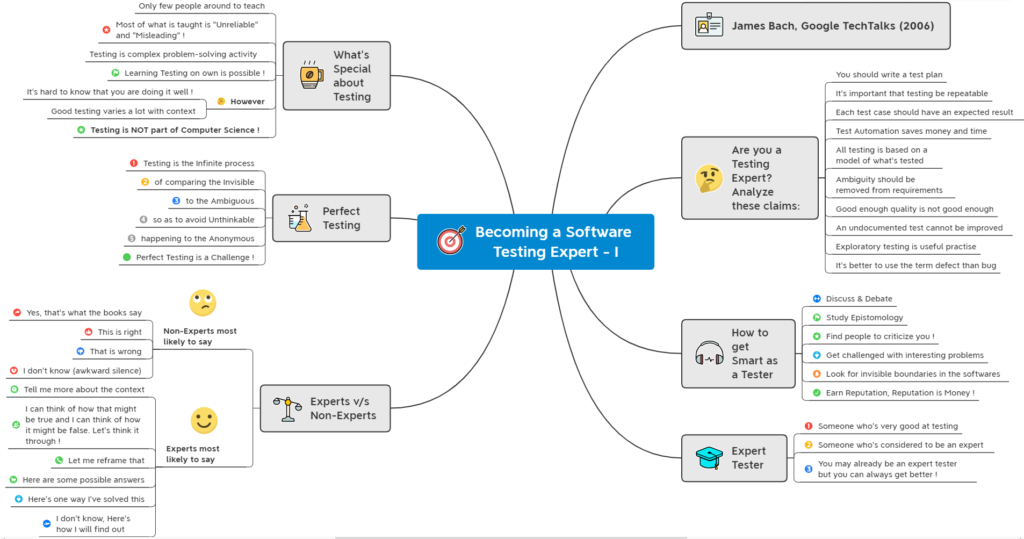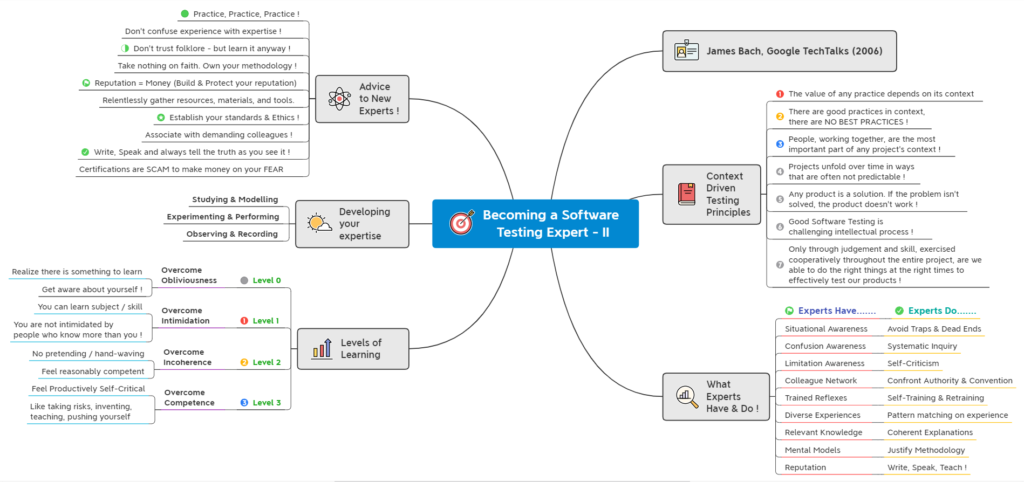These are the notes prepared from a talk by James Bach on Google Tech Talks 2006 on How to be a Software Testing Expert.
Here is the link to the full video: Becoming a Software Testing Expert – YouTube
These are helpful pointers that I have been referencing time and again. Posting it here for my quick self-reference.


Commentary on the above notes:
Becoming a software testing expert
Software testing is more than just executing test cases and logging defects. It is a problem-solving activity that requires critical thinking, analytical skills, and a deep understanding of software behavior. Becoming an expert in this field is a journey of continuous learning, exploration, and refinement. Let’s dive into what it takes to become a true software testing expert.
What’s special about testing
Software testing stands apart from other disciplines in technology. Unlike software development, where you build something from scratch, testing is about investigating and questioning what has been built. Here’s why testing is unique:
- Limited guidance – There are only a few experts available to teach testing comprehensively.
- Unreliable knowledge – Many things taught about testing are misleading or incomplete.
- Complexity – Testing is not a mechanical task; it is a challenging problem-solving activity.
- Self-learning is possible – While guidance may be scarce, dedicated testers can learn on their own.
- Context matters – A good testing approach varies based on the project, domain, and stakeholders.
- Not just coding – Unlike common belief, software testing is not a subset of computer science. It is a separate discipline with its own methodologies and practices.
The challenge of perfect testing
Striving for perfect testing is like chasing an illusion. Testing is an infinite process with moving targets. Here’s why:
- Comparing the invisible – Many issues are hidden beneath the surface and are not immediately obvious.
- Dealing with ambiguity – Requirements, expectations, and software behavior are often unclear.
- Avoiding the unthinkable – Testers anticipate risks and failures that others might overlook.
- Anonymous impact – Issues may affect users in unexpected ways, making testing more challenging.
- No absolute perfection – Even with extensive testing, unknown issues can still exist.
While perfection is unattainable, testers strive to be as thorough and effective as possible. The goal is to uncover critical issues before they reach users.
Are you a testing expert? Analyze these claims
Expertise in testing requires independent thinking. Consider these common claims about testing and analyze whether they hold true in all situations:
- “You should write a test plan” – Is a detailed test plan always necessary?
- “Testing should be repeatable” – Does this apply to all testing types, including exploratory testing?
- “Each test case should have an expected result” – What about scenarios where the expected outcome is unknown?
- “Test automation saves time and money” – Are there cases where automation is more expensive than manual testing?
- “Ambiguity should be removed from requirements” – Is complete clarity always achievable?
- “Good enough quality is not good enough” – Is this realistic for all projects?
- “An undocumented test cannot be improved” – Does every test need documentation?
- “It’s better to use the term defect than bug” – Does terminology matter in all contexts?
Thinking critically about such claims is a key trait of an expert tester. Blindly following industry practices without questioning their relevance can lead to ineffective testing.
Experts vs. non-experts
What sets experts apart from non-experts in testing? Their approach to learning and problem-solving.
Non-experts tend to say:
- “Yes, that’s what the books say.”
- “This is right. That is wrong.”
- “I don’t know.” (followed by silence)
Experts, on the other hand, say:
- “Tell me more about the context.”
- “I can think of how that might be true and how it might be false. Let’s explore.”
- “Let me reframe that.”
- “Here are some possible answers.”
- “Here’s one way I’ve solved this before.”
Experts focus on context, critical thinking, and adaptability. Instead of memorizing rules, they analyze situations and apply testing principles accordingly.
How to get smart as a tester
Becoming an expert requires continuous effort. Here’s how you can sharpen your testing skills:
- Discuss and debate – Engage in conversations with testers, developers, and stakeholders to challenge your assumptions.
- Study epistemology – Understanding the theory of knowledge helps improve reasoning skills.
- Find people to criticize you – Constructive feedback pushes you to improve.
- Get challenged with interesting problems – Work on complex projects that require deep testing insights.
- Look for invisible boundaries in software – Identify hidden limitations and assumptions in systems.
- Earn a reputation – Your credibility in the community is valuable.
What makes an expert tester?
There is no single definition of an expert tester. Here’s how expertise can be viewed:
- Someone who is exceptionally good at testing.
- Someone who is recognized as an expert by others.
- Someone who continues to grow, no matter how experienced they are.
If you already have strong testing skills, that’s great! But there’s always room to improve. Learning from real-world experiences, questioning established norms, and engaging with the testing community will help you refine your expertise.
More thoughts
Becoming a software testing expert is not about following rigid guidelines or memorizing best practices. It’s about thinking critically, adapting to new challenges, and continuously improving your approach to testing. Challenge assumptions, experiment with different techniques, and never stop learning. That’s the path to true expertise in software testing.
Enjoyed this post? Here’s what you can do next:
- 📢 Share this post | Twitter | LinkedIn | WhatsApp
- 📚 Checkout my free Gen AI for Testers Course
- 📖 Buy a copy of Ultimate Productivity Toolkit
- 🎓 Book a call with me on Topmate
Thank you for reading! 😊
